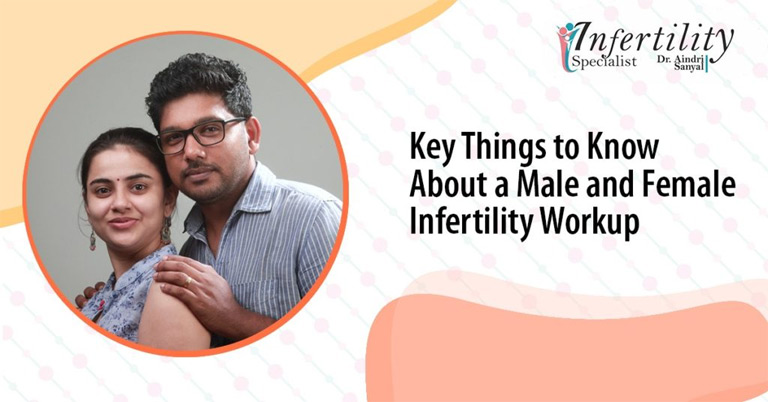
Girish is a senior executive in a multi-national company. His days are jet-setting with constant meetings and frequent travels. Late night parties with friends and colleagues are common, fast food, drinking and smoking a part of his daily life. His career graph is showing a healthy upward trend, but the same cannot be said about his health. A mostly sedentary lifestyle, unhealthy diet and work stress has resulted in his gaining weight substantially. But that did not worry him unduly. Marriage brought additional responsibilities and he began thinking of a family…
The first warning sign that all was not ‘normal’ for the couple came when they failed to conceive after two years of conjugal life. Work began to suffer, as turmoil in his personal space increased. The couple decided to visit an infertility specialist, who suggested tests for both of them. The problem was male factor infertility. Girish’s sperm count was low and of poor quality….
Male factor infertility is increasingly becoming more common, with studies showing that in couples being unable to conceive, 35-40% are due to problems in the men.
What is male infertility?
A man’s role in fertilization is quite complex. Of the 200 million sperm produced by the man only about 15-45 million arehealthy enough to fertilize an egg. After a man ejaculates, only 400 of these healthy sperms survive, of which just 40 manage to reach near the egg. After a process called Capacitation – a sort of an explosion that enables the sperm to drill a hole through the tough outer covering of the egg, only one sperm manages to reach the egg and fertilize it. As you can understand, this journey is not easy and a happy outcome depends on a number of factors tied to the sperm’s journey and health. The foremost challenge here is the quantity and quality of the sperm produced by the man. Any shortcoming in either can increase the challenge of a lone, healthy sperm reaching the egg to fertilize it. Male infertility stems from this challenge.
This brings us to the factors responsible for male infertility or inconsistencies in sperm production and how important is the lifestyle you choose to follow.
Let us discuss some lifestyle factors and how they can impact your fertility.
Smoking
Cigarette smoking is known to affect sperm health, both the quantity and quality parameters. It is directly related to:
- Decreased sperm concentration: Smokers show a 23% decrease in the number of sperms found in a measured quantity of semen
- Motility (movement of sperm): This refers to the swimming capability of the sperm. If sperm is not able to move as desired, then it will also find it difficult to reach the egg. Smokers show a 13% increased risk of poor sperm motility
- Abnormal sperm shape: Oddly shaped sperm find movement difficult, hence reducing motility.
- Increased sperm damage due to fragmented DNA: Damaged sperm can lead to a number of issues related to conception, including problems with fertilization, embryo implantation and development, increased risk of miscarriages.
Though smoking may not actually induce infertility, they are likely to negatively impact men with borderline infertility. Quitting smoking on the other hand is known to improve chances of conception.
Obesity
Excess weight is often associated with low testosterone levels and poor sperm quality. Obesity is also known to alter the structure of sperm, thus increasing chances of infertility. An obese person is more likely to experience erectile dysfunction. Poor sperm quality and damaged sperm increases risk of poorly developed embryo, miscarriage and premature birth. Recent studies have shown that male obesity also increases risk to the next generation – who are likely to inherit an increased susceptibility to obesity and chronic diseases like diabetes.
Diet & Exercise
The two things that often go neglected as career takes precedence. Incorrect diet over a long period of time can cause conditions like obesity, hypertension or diabetes, that in turn can impact a man’s fertility. Balanced exercise is as important as a balanced diet. Lack of exercise is unhealthy for your sperm health, but so is over exercising. Excessive exercise reduces testosterone levels, which in turn can lower the sperm count. Regular intense workouts at the gym and muscle building steroids are known to cause fertility issues, as they are likely to shrink your testicles. So, balance is the keyword when it comes to your fertility health.
Hot-tubs & Sauna
In this case, remember less is more. Too much heat is not good for your testicles. Men who spend time regularly in hot tubs or saunas expose their testicles to too much heat, and this, studies have shown, negatively impacts sperm health. It is advisable to avoid any regular activity that involves long exposure to heat.
Stress
Much has been said about the definite link of stress to increasing infertility, both in men and women. So, how does stress impact a man’s fertility? Increased levels of stress over a long period of time tends to decrease testosterone levels, lower sperm production, and decreases sperm motility.
While a person’s lifestyle is just one factor among the reasons for infertility in men, it is important to understand that this is an area that is largely in your control. It has been seen that people who have consciously made lifestyle changes, choosing a healthier and more balanced lifestyle, have responded better to infertility treatments. Remember, it is often the choices you make that make all the difference and small adjustments can go a long way in helping you achieve your dream of parenthood.





